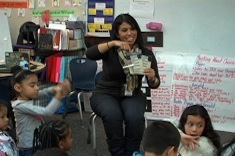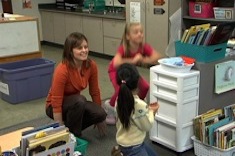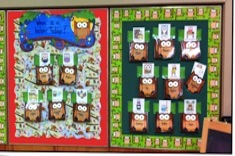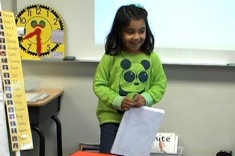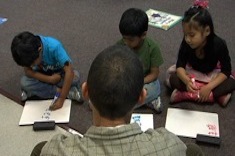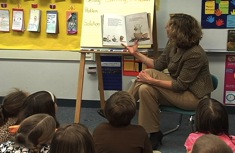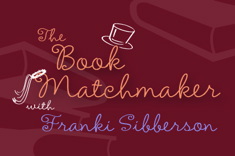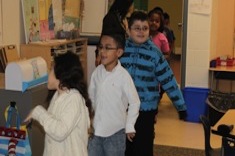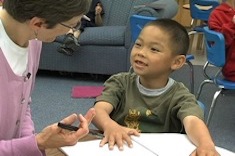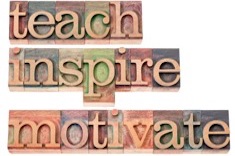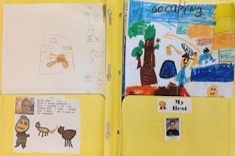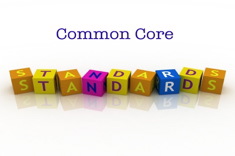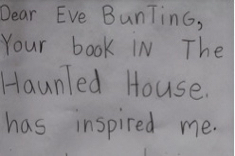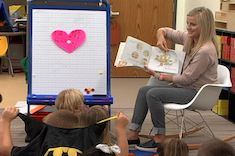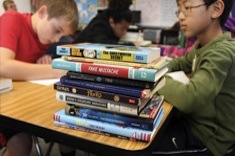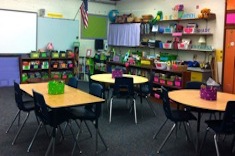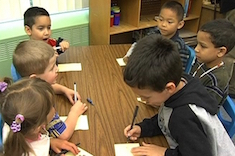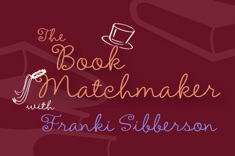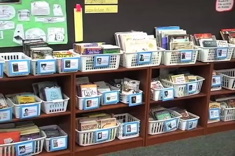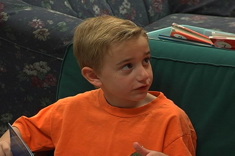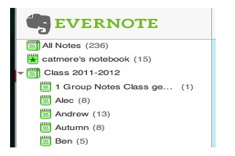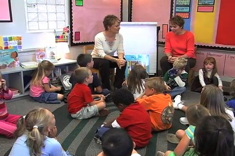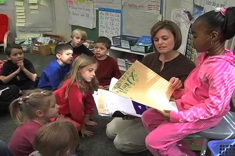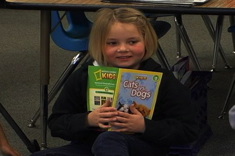1st
Latest Content
Integrating Vocabulary and Retelling Strategies into Read-Aloud
Stella Villalba scaffolds the language development of her first- and second-grade English language learners during read-aloud by highlighting vocabulary and providing a tool to assist with a partner retelling activity.
Conferring to Build Stamina in First Grade
Katie DiCesare works with first grader JJ to help him meld decoding and comprehension skills.
Movement with First Graders
Katie DiCesare leads her first-grade students through movements and a song, and explains in the debrief why movement activities are valuable for young learners.
Classroom Jobs Build Community
Keri Archer describes her process of creating a jobs list for her kindergartners, as well as how she has adapted the tasks based on the evolving class community.
Whole Class Writing Share: Teaching Response Skills in 1st Grade
Katie DiCesare’s first graders respond to their classmates’ writing, using questions they developed together over time.
Using Wipe-Off Boards with Young English Language Learners
Max Brand describes why wipe-off boards are such a valuable tool for work with young English language learners in small groups. The article includes a video demonstration.
Previewing and Picture Walks with Fiction Texts
Clare Landrigan and Tammy Mulligan provide previewing how-to advice for grades K-2 teachers.
Book Matchmaker: Nonfiction to Read Cover to Cover
With the Common Core emphasis on nonfiction, teachers are striving to integrate more nonfiction texts throughout their literacy workshops. Franki Sibberson shares her favorite nonfiction texts that can be read cover to cover.
Eliminating the Conga Line: Teaching Young Children About Strategic Thinking
Clare Landrigan and Tammy Mulligan manage to synthesize workspace cleanup, student independence, and a concrete analogy for strategy work in classrooms.
Hearing Carlos: Helping Young English Language Learners Develop Speaking and Listening Skills
Stella Villalba incorporates more speaking and listening activities into her primary classroom for English language learners.
Writers Inspiring Writers
Melissa Styger invites colleagues and family members into the classroom to share their writing process with students.
Informational Snapshot Writing
Heather Rader finds web video is a powerful tool for scaffolding young writers as they produce informational texts.
Book Matchmaker: Read Aloud Versions of Old Favorites
Franki Sibberson presents some delightful versions of classic tales perfect for read alouds with youngsters.
Formative Assessment: Wall Displays and Conversations in First Grade
Formative assessments are always a priority in classrooms. Cathy Mere explains how she uses a classroom wall display and conversations to highlight strong writing and help her first graders learn to assess improvements in their work.
Supporting Young Writers with Opinion Texts
Katie DiCesare considers how different texts at the primary level can support student understanding of standards for opinion and argumentative writing.
Dear Eve Bunting
A persistent seven-year-old has some powerful messages about confidence, patience, and sending writing out into the world.
Field Experience: Social-Emotional Learning in Workshop
Compassion and understanding are as important to workshop instruction as strategies and routines. Ruth Ayres compiled a field experience to highlight the way understanding the social-emotional needs of students (and ourselves) allows for safe learning environments.
Field Experience: Craft Moves for Elementary Writers
This field experience invites us to consider a handful of craft moves to teach young writers in minilessons, conferences and share sessions.
Field Experience: Classroom Tours
Spend time noticing the details that reflect beliefs and influence instruction. Ruth Ayres set up room tours for a field experience focused on more than trendy spaces.
Field Experience: Small Group Reading Instruction
Small group reading instruction is an important part of elementary literacy. This field experience is a sampling of a variety of examples.
Field Experience: General Workshop Routines
This field experience invites us to consider the routines of opening the day, workshop norms, meeting areas and transitions to make workshop run smoothly.
Are Your Writers Talking During Writing Workshop?
Stella Villalba shares practical tips for helping young English language learners collaborate with classmates and receive feedback during writing workshop.
Book Matchmaker: Read Alouds for 1st Grade
Franki Sibberson helps a 1st grade teacher select read alouds for her class in this installment of Book Matchmaker.
Book Matchmaker: Texts for Young English Language Learners
Franki Sibberson shares some of her favorite new titles for young English language learners.
If You Like Junie B. Jones, You Might Like . . .
What young learner doesn’t love Junie B. Jones? Franki Sibberson shares great texts to recommend for readers who adore Junie and might be looking for similar characters and plots.
Fluency in Focus: Conferring with Jake
Gail Boushey confers with Jake, a seven-year-old who is setting a reading goal of developing fluency. After the conference, she debriefs with Joan Moser.
Capturing Student Learning with Evernote
It can be difficult to move from print to electronic records in the classroom. After using a spiral notebook for 10 years, Cathy Mere did just that.
Grades K-2 Fluency Lesson
In this video from a K-2 multiage classroom, Joan Moser and Gail Boushey ("The Sisters") present a fluency lesson to the whole class.
More Productive Writing Share Sessions in First Grade
In this video from a first-grade classroom, Katie DiCesare demonstrates how she has made writing share time more productive by linking student work to recent lessons.
Previewing Nonfiction
Teachers are adding more nonfiction to their classroom libraries, and looking for ways to promote nonfiction with students in light of the emphasis on nonfiction in the Common Core. Franki Sibberson share tips for previewing nonfiction with students.
Browse Content By
Type
Category
- Assessment Tools
- Big Fresh Archives
- Booklists
- Choice Numeracy
- Classroom Design
- Common Core
- Community Building
- Conferring
- Content Literacy
- Digital Literacy
- English Language Learners
- Equity
- Family Relations
- Free Samples
- Guiding Groups
- Leadership
- Literacy Coaches
- Mentor Texts
- Minilessons
- New Teacher Mentors
- Podcasts
- Poetry
- Quote Collections
- Reading Strategies
- Self Care
- Struggling and Striving Learners
- Talking and Listening
- Teacher Study Groups
- Teaching Reading
- Teaching Writing
- Word Study and Vocabulary
Author
- Melissa Quimby
- Nawal Qarooni
- Gwen Blumberg
- Julie Cox
- The Lead Learners
- Hannah Tills
- Josie Stewart
- Ruth Metcalfe
- Mallory Messenger
- Becca Burk
- Jodie Bailey
- Vivian Chen
- Mary Brower
- Tiffany Abbott Fuller
- Stephanie Affinito
- Ruth Ayres
- Leigh Anne Eck
- Heather Fisher
- Shari Frost
- Julie Johnson
- Suzy Kaback
- Gigi McAllister
- Shirl McPhillips
- Melanie Meehan
- Cathy Mere
- Debbie Miller
- Tara Barnett and Kate Mills
- Tammy Mulligan
- Dana Murphy
- Bitsy Parks
- David Pittman
- Brenda Power
- Heather Rader
- Matt Renwick
- Mandy Robek
- Christy Rush-Levine
- Gretchen Schroeder
- Jen Schwanke
- Brian Sepe
- Katherine Sokolowski
- Stella Villalba
- Jennifer Vincent
Grade Level
Choice Literacy Membership
Articles
Get full access to all Choice Literacy article content
Videos
Get full access to all Choice Literacy video content
Courses
Access Choice Literacy course curriculum and training

